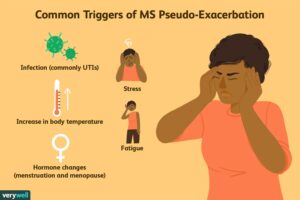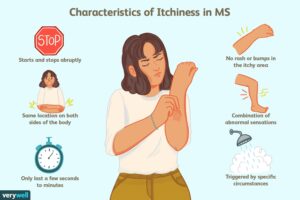Multiple sclerosis (MS)






Multiple sclerosis (MS) is a chronic disease that affects the central nervous system (CNS), which is made up of the brain, spinal cord, and optic nerves. In MS, the immune system attacks the myelin sheath, a protective layer that surrounds nerve fibers. This damage can disrupt or slow down the transmission of nerve signals, leading to a variety of symptoms, including fatigue, vision problems, numbness and tingling, muscle weakness, and problems with balance and coordination.
The exact cause of MS is unknown, but it is thought to be a combination of genetic and environmental factors. There is no cure for MS, but there are treatments that can help to manage the symptoms and slow the progression of the disease.
The symptoms of MS can vary widely from person to person and can change over time. Some of the most common symptoms include:
- Fatigue
- Vision problems, such as blurred vision, double vision, or loss of vision
- Numbness and tingling in the limbs
- Muscle weakness
- Problems with balance and coordination
- Pain
- Problems with thinking, memory, and concentration
- Mood problems, such as depression and anxiety
- Sexual problems
The severity of the symptoms can range from mild to severe. Some people with MS have only a few mild symptoms, while others may have more severe symptoms that significantly impact their daily life.
The course of MS is also unpredictable. Some people with MS have a relapsing-remitting course, which means that they experience periods of acute symptoms (relapses) followed by periods of remission when the symptoms improve or disappear. Others have a progressive course, which means that their symptoms gradually worsen over time.
There is no cure for MS, but there are treatments that can help to manage the symptoms and slow the progression of the disease. The goal of treatment is to keep the disease as active as possible and to help people with MS live as full and active lives as possible.
The treatments for MS include:
- Disease-modifying therapies (DMTs): These medications are used to slow the progression of the disease and reduce the frequency of relapses.
- Symptomatic treatments: These medications are used to manage the specific symptoms of MS, such as fatigue, pain, and bladder problems.
- Rehabilitation: Rehabilitation services can help people with MS to improve their mobility, balance, and coordination.
- Complementary and alternative therapies: Some people with MS find relief from symptoms with complementary and alternative therapies, such as acupuncture, yoga, and massage therapy.
If you are experiencing symptoms of MS, it is important to see a doctor for diagnosis and treatment. Early diagnosis and treatment can help to improve the outcome of the disease.
